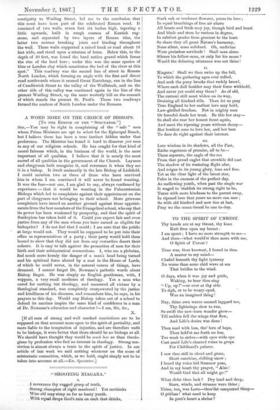A WORD MORE ON THE CHOICE OF BISHOPS. [To THE
EDITOR OF THE "SPECTATOR."] SIR,—You may be right in complaining of the " safe " men whom Prime Ministers are apt to select for the Episcopal Bench, but I believe there has been a true instinct hidden under that preference. The Minister has found it hard to discover just men in any of our religious schools. He has sought for that kind of moral fairness which, in the business of the world, is the most important of all qualities. I believe that it is nearly the most sacred of all qualities in the government of the Church. Laymen and clergymen both recognize it, and reverence it when they see it in a bishop. It dwelt eminently in the late Bishop of Lichfield. I could mention two or three of those who have survived him in whom I am convinced it will never be found wanting. It was the fear—not one, I am glad to say, always confirmed by experience — that it would be wanting in the Palmerstonian Bishops which led to complaints against their appointment on the part of clergymen not belonging to their school. More grievous complaints have issued on another ground against those appoint- ments from the best members of the Evangelical school, who say that its power has been weakened by prosperity, and that the spirit of fiunkeyism has taken hold of it. Could you expect fair and even justice from any of the men whom you have named as eligible for bishoprics? I do not feel that I could ; I am sure that the public at large would not. They would be supposed to be put into their office as representatives of a party ; their party would hold them bound to show that they did not from any cowardice desert their colours. It is easy to talk against the promotion of men for their birth and their aristocratical connections. I, who am a plebeian, feel much more keenly the danger of a man's head being turned and his spiritual force abated by a seat in the House of Lords, of which he could never, in the natural course of things, have dreamed. I cannot forget Dr. Newman's pathetic words about Bishop Begot. He was simply an English gentleman, with, I suppose, a very small modicum of theology. Yet a man who cared for nothing but theology, and measured all virtues by a theological standard, was completely overpowered by the justice and kindliness of his diocesan, and remembers him, he says, in his prayers to this day. Would any Bishop taken out of a school to defend its maxims inspire the same kind of confidence in a man of Dr. Newman's education and character ?—I am, Sir, &c., X. [If all men of strong and well marked convictions are to be supposed on that account more open to the spirit of partiality, and more liable to the temptation of injustice, and are therefore unfit to be bishops, it were better that there should be no bishops at all. We should have thought they would be much less so than theolo- gians by profession who feel no interest in theology. Strong con- viction is almost always a tonic to the spirit of justice. In our article of last week we said nothing whatever on the score of aristocratic connection, which, as we hold, ought simply not to be taken into account at all.—En. Spectator.]






























 Previous page
Previous page